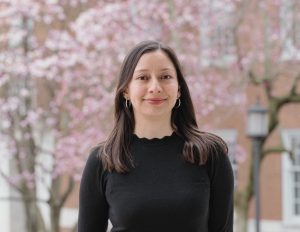This article is part of a series featuring Q&As with Ralph O’Connor Sustainable Energy Institute (ROSEI)-affiliated researchers. Next up is Regina García-Méndez, an assistant professor in the Department of Materials Science and Engineering and a ROSEI core faculty member. She joined Hopkins in September 2023.

Regina García-Méndez
How did you first get involved with or learn about sustainability?
Regina García-Méndez (RGM): That happened while I was pursuing my undergraduate degree in chemical engineering at UVG in Guatemala. I decided to do a capstone project with a couple of classmates that focused on building a prototype that could power an uninterruptable power supply through hydrogen generation, storage, and conversion. I found that that experience not only helped develop my skills as a teammate but also showed me how much I love doing hands-on experiments. Translating what I am doing in theory into a practical setting helps me to be more engaged, and understand how concepts work in the real world. The project was fulfilling, and it was my first experience working in sustainability.
Why are you passionate about sustainability/renewable energy?
RGM: Climate change is one of the most pressing challenges we face as a society. Without decisive actions, energy-related carbon dioxide emissions will double by 2050. The transition to a future society that utilizes more sustainable energy is of utmost importance, and I think low-carbon energy technologies will play a critical role in helping with that transition.
I also think as habitants of planet Earth that we are custodians, and it’s important to take the responsibility of safeguarding it seriously to protect the wellbeing of current and future generations.
How does your commitment to sustainability play out in your everyday life?
RGM: I own a scooter that I use all the time. It’s electric, and I think the future of transportation is electric, so that’s why I bought it. I also don’t drive to work; I take public transportation.
I think where I make the most effort is trying to be mindful of my water and energy consumption. I am very conscious of how I use both and am aware that freshwater is not available to everyone in the world. It is a precious and finite resource, so I try to only use what I need.
Tell us about your research, and what aspects currently or in the future tie into sustainable energy efforts.
RGM: My research focuses on advanced materials characterization, materials chemistry, and materials processing, specifically developing scalable technologies related to energy storage and electrocatalysis for renewable fuels. The main goal of my group is to understand the behavior of materials through multiscale characterization to address energy and environmentally related challenges. This work is multidisciplinary by design, involving materials science, chemical engineering, mechanical engineering, and chemistry. As I mentioned, advanced characterization techniques will facilitate our aim to prove the composition, structure, and interaction of interfaces within these systems.
My intention is to train the next generation of leaders that will help develop low-carbon energy technologies.
Is there an article, book, or podcast that people can check out to help better understand the area you work in or your specific work?
RGM: Stanford University hosts a series of symposiums called the Storage X Energy Initiative. Every month they welcome international leaders in academia and industry to discuss challenges that we face in energy storage in a variety of settings. It discusses the challenges we are facing that need to be overcome to accelerate the development, translation, and adoption of energy solutions.
What advice or suggestions do you have for students who want to pursue careers in sustainable energy?
RGM: Take the time to reflect and understand why you want to pursue a career in sustainable energy because it will serve as a driving force behind your actions and decisions. Having a clear understanding of what motivates you, can significantly enhance your ability to achieve your goals as it will sustain your efforts boost resilience, and help prioritize your actions.
Aside from that, get exposed to anything and everything that catches your attention. You might end up being passionate about a certain subject that you wouldn’t have guessed that you’d enjoy until learning more about it. This is a great time to explore different avenues to make meaningful contributions to something that matters to you.
You joined Hopkins recently. How have you found the sustainable energy community here to be thus far?
RGM: I have found Hopkins to be an intellectually stimulating environment. Everyone is super supportive and nice.
Work culture is important to me, and that was one of the main reasons I chose to come to Hopkins. When I interviewed for Hopkins, everyone was on board to help me succeed. Every piece of feedback I got during that process was constructive, so I felt like people here were passionate about helping my vision for my ideal career become a reality.